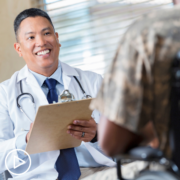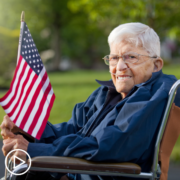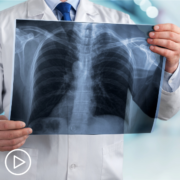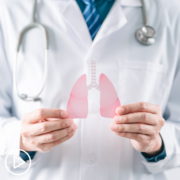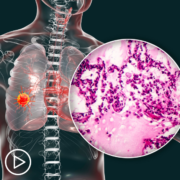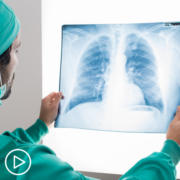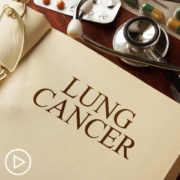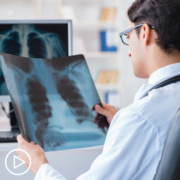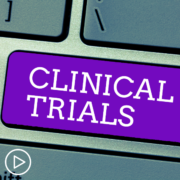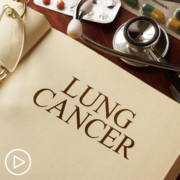Unveiling Racial Disparities in Early-Stage Lung Cancer Treatment from Patient Empowerment Network on Vimeo.
For early stage lung cancer treatment, what are root causes of racial disparities? Expert Dr. Samuel Cykert from UNC School of Medicine discusses key findings from UNC research and proactive advice to patients to help reduce disparities.
[ACT]IVATION TIP
“…even in advanced disease, there are some excellent responses to these therapies, so getting back to what do I say to patients, don’t feel doom, be enthusiastic about, I really want treatment. I really want to go ahead and see what you can do for me. And even if that involves research testing and protocols. So enthusiasm is important. And the other thing that’s important is, again, because of some of these implicit biases I mentioned, actually asking positive questions to the clinicians and staff saying, I feel really good about going ahead and doing what I can do, how do you think I’ll do? Enlist them as part of your team, get rid of their gloom and doom too.”
Download Resource Guide | Descargar guía de recursos
See More from [ACT]IVATED Non-Small Cell Lung Cancer
Related Resources:
Transcript:
Lisa Hatfield:
Dr. Cykert, could you elaborate on the key findings or insights uncovered by the UNC research team regarding the root causes of racial disparities in the treatment of early stage lung cancer patients, and also …how do these findings contribute to our understanding of healthcare disparities and inform future interventions in lung cancer?
Dr. Samuel Cykert:
Yeah, and first of all, I want to make a statement up front that in doctor’s treatment of lung cancer and other cancers and other chronic diseases, there is not malevolence here, okay, because doctors go to medical school, the vast majority go as idealists, and so I think it’s really important not to place blame here, but there’s a way that the system is set up, both in terms of health insurance, economics, other socio-demographic factors, where people of color are disadvantaged.
And then you add to that an element of implicit bias, we all have implicit bias, different kind of implicit biases, and in a study that we published in the Journal of the American Medical Association in 2010, we showed that clinicians who take care of lung cancer tend to not want to take risks on patients who aren’t like them, who they don’t feel comfortable communicating with, and so Black patients who had two or more significant comorbidities at the time of surgery virtually never got lung cancer surgery, whereas white patients with two or more comorbidities still did.
So a lot of that had to do with the clinician side of thinking, well, I don’t know if, I mean, you’re kind of sick to start with, and I don’t know how well you’d do, and so the clinician isn’t aggressive in explaining things about surgery and pushing toward surgery, where with a patient that’s like them, when there’s a family member in the room saying, “Doc, Doc, what are you going to do about dad’s cancer?” Then in those cases, the clinical decision making is more aggressive, and so that was a big thing, and another thing that we discovered is if Black patients felt that the shared communication, that the discussions were poor, they were much, much more reluctant to go to surgery, so there’s a communication thing, making sure that people are understanding each other.
And you have to remember a lot of times when people hear the word cancer, they automatically shut down and they start listening, and then on top of that, if the communication and the connection is poor, then the listening and discussion is even worse, so those were two big areas where we found that Black patients were disadvantaged even beyond the socio-economic stuff. As far as interventions go, based on that, based on two things, based on that 2010 trial and based on a community group that I’ve been a part of through the years called the Greensboro Health Disparities Collaborative in Greensboro, North Carolina, that community group has pointed out three ways to overcome disparities in cancer and other medical care.
One way is real-time transparency. When you think about it, all the studies that show disparities in cancer are studies that look at data that are four or five or six years old. Well, if you have cancer and the data are four or five, six years old, if you don’t act on it, you’re dead, and so we need to use real-time data, and there’s no reason we can’t do that today with electronic health records and all the digital data floating around health systems, we can create real-time registries in order to take better care of cancer patients. So that’s one thing.
The second thing that the collaborative pointed out was accountability, I mean, the primary care doctor can’t say, well, it’s the oncologist. The oncologist can’t say, well, it’s the surgeon. The surgeon can’t say, well, it’s the radiation oncologist and the primary care doctor. We can’t diffuse responsibility. We have to have accountability. And so the way we put together accountability in our intervention is we gave feedback to the cancer care teams, and we not only said, this is how well you’re doing with patients completing surgery and patients completing their other treatments, we break it down by the disadvantaged group, so we say, here’s how your white patients are doing, here’s how your Black patients are doing, here are how your Hispanic patients are doing.
Whatever the disadvantaged group is, we compare. And the other great thing about doing that is when you get, for instance, quarterly quality data about how you’re doing with treatment in different groups, you can sit in the room and you can start saying, well, what’s going on here, why are these differences existing? And in one of our studies, for instance, Cone Health in Greensboro noted that in one particular geographic area, transportation was horrendous and patients missed a bunch of appointments, and then they created their own transportation van when scheduling appointments, and the disparity went away, that was based on the transportation problem. Okay? So by looking at those things in real time, you can iterate and decide how you’re going to fix that. So that’s the second thing, accountability.
And the third thing that the group brought up was communication. Doctors often talk in medical jargon. Patients don’t understand. Patients don’t understand and they interpret the conversation in the wrong way. That fosters mistrust, and also, you have that idea that I mentioned earlier, that patients don’t process things after they hear the cancer word, and so instead of just communication right now in this acute setting, you need engagement and re-engagement, and that’s where we brought in a specially trained navigator who was aware of these communication problems, who was aware of particular problems that might affect patients of color, and that navigator would use that knowledge to engage and re-engage patients over time, to bring them back into care.
And just going back to one of my earlier points on real-time transparency, in our studies, we actually built a real-time system where we followed patients over time, and if a patient missed an appointment, an automatic warning would come up that said to the navigator, you need to re-engage the patient, but the other thing we did to deal with implicit bias and clinical inertia is we set time limits in the system.
So if care wasn’t progressing the way we thought it should progress on a time scale that was actually established by medical stakeholders in that community, if, for instance, if the patient didn’t get a follow-up visit or a test within 30 days, bam, a warning came up. If the patient didn’t get a biopsy within 60 days, a warning came up. If they weren’t scheduled for surgery or definitive care within 60 days, a warning came up.
So we not only engaged the patient when the patient was missing, but we engaged the clinical team and said, did you really mean for these delays to happen? And with our intervention, in terms of completing care, we went at baseline from 70 percent, compare completion, 70-ish percent for white patients, compared to 60 percent for Black patients, to almost perfect care for everyone. In over 300 patients, it was 95 percent and 96 percent completing their care. So that was just a phenomenal improvement because we had real-time transparency, accountability and communication.
Lisa Hatfield:
Those are incredible statistics on how you can build this system to help eliminate some of those disparities in healthcare. Would you have any activation tips from the patient perspective? I mean, you explained this so well, do you have any tips for patients?
Dr. Samuel Cykert:
Yes. I mean, patients…first of all, patients are in a situation where lung cancer, the narrative around lung cancer over time has been one of nihilism and doom. And people think once I have the diagnosis of lung cancer, I’m dead and there’s nothing I can do about it. Well, in early stage, non-small cell lung cancer, the cure rates have gone up, especially with adjuvant chemotherapy, and now it looks like it’s going to happen with some neoadjuvant biological and chemotherapy, so things are getting better and better.
And even in advanced disease, there are some excellent responses to these therapies, so getting back to what do I say to patients, don’t feel doomed, be enthusiastic about, I really want treatment. I really want to go ahead and see what you can do for me. And even if that involves research testing and protocols. So enthusiasm is important. And the other thing that’s important is, again, because of some of these implicit biases I mentioned, actually asking positive questions to the clinicians and staff saying, I feel really good about going ahead and doing what I can do, how do you think I’ll do? Enlist them as part of your team, get rid of their gloom and doom too.
Share Your Feedback
Create your own user feedback survey
